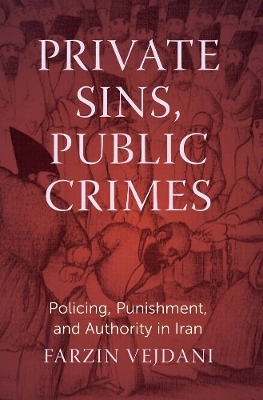
Private Sins, Public Crimes
Policing, Punishment, and Authority in Iran
Seiten
2025
Yale University Press (Verlag)
978-0-300-27568-1 (ISBN)
Yale University Press (Verlag)
978-0-300-27568-1 (ISBN)
- Noch nicht erschienen (ca. Januar 2025)
- Versandkostenfrei innerhalb Deutschlands
- Auch auf Rechnung
- Verfügbarkeit in der Filiale vor Ort prüfen
- Artikel merken
A groundbreaking scholarly study of crime and punishment in Qajar Iran
Drawing on a rich array of primary sources in multiple languages, Farzin Vejdani argues that the ambiguity in defining the boundaries between private and public in Qajar Iran often corresponded with the jurisdictional friction between government authorities and religious scholars regarding who had the authority to police and punish public crimes. This ambiguity had implications for the spaces in which illicit acts were carried out: “private” parties in domestic residences where music, alcohol, and prostitution were present were often tolerated by local police officials but raised the ire of religious authorities and their followers, who raided these residences, ironically in violation of strong Islamic norms of privacy.
Crimes that were manifest but remained unpunished triggered a crisis of legitimacy that often coincided with upstart Islamic religious scholars challenging the state’s authority. Even when the government had every intention of punishing a crime, convicted criminals sought shelter in sanctuaries—including shrines, mosques, royal stables, and telegraph offices—which were even more inviolable than private residences. This inviolability, grounded in both Islamic prohibitions of violence on sacred grounds and Iranian imperial traditions of redress, allowed criminals to negotiate a lesser sentence, safe passage for voluntary exile, or forgiveness.
Drawing on a rich array of primary sources in multiple languages, Farzin Vejdani argues that the ambiguity in defining the boundaries between private and public in Qajar Iran often corresponded with the jurisdictional friction between government authorities and religious scholars regarding who had the authority to police and punish public crimes. This ambiguity had implications for the spaces in which illicit acts were carried out: “private” parties in domestic residences where music, alcohol, and prostitution were present were often tolerated by local police officials but raised the ire of religious authorities and their followers, who raided these residences, ironically in violation of strong Islamic norms of privacy.
Crimes that were manifest but remained unpunished triggered a crisis of legitimacy that often coincided with upstart Islamic religious scholars challenging the state’s authority. Even when the government had every intention of punishing a crime, convicted criminals sought shelter in sanctuaries—including shrines, mosques, royal stables, and telegraph offices—which were even more inviolable than private residences. This inviolability, grounded in both Islamic prohibitions of violence on sacred grounds and Iranian imperial traditions of redress, allowed criminals to negotiate a lesser sentence, safe passage for voluntary exile, or forgiveness.
Farzin Vejdani is associate professor of history at Toronto Metropolitan University. He is the author of Making History in Iran: Education, Nationalism, and Print Culture and the recipient of an Honorable Mention for the Houshang Pourshariati Iranian Studies Book Award. He lives in Toronto, Canada.
| Erscheint lt. Verlag | 28.1.2025 |
|---|---|
| Zusatzinfo | 22 b-w illus. |
| Sprache | englisch |
| Maße | 156 x 235 mm |
| Themenwelt | Sonstiges ► Geschenkbücher |
| Recht / Steuern ► Strafrecht ► Kriminologie | |
| ISBN-10 | 0-300-27568-4 / 0300275684 |
| ISBN-13 | 978-0-300-27568-1 / 9780300275681 |
| Zustand | Neuware |
| Haben Sie eine Frage zum Produkt? |
Mehr entdecken
aus dem Bereich
aus dem Bereich
wie wir unsere Mimik und verborgene Körpersignale entschlüsseln
Buch | Hardcover (2022)
Droemer (Verlag)
20,00 €


